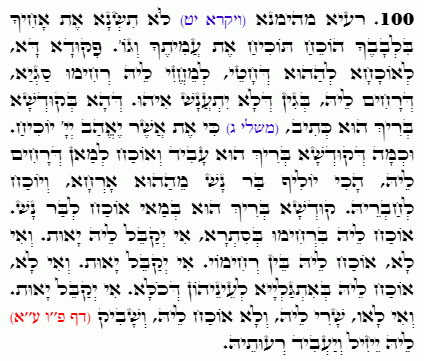Daily Zohar # 4606 – Kedoshim – Approach with love
Daily Zohar 4606

Hebrew translation:
.
Zohar Kedoshim
Continued from previous DZ
#100
Leviticus 19:17
“לֹא תִשְׂנָא אֶת אָחִיךָ בִּלְבָבֶךָ הוֹכֵחַ תּוֹכִיחַ אֶת עֲמִיתֶךָ וְלֹא תִשָּׂא עָלָיו חֵטְא.”
“‘You shall not hate your brother in your heart. You shall surely rebuke your neighbor and not bear sin because of him.”
This commandment is to rebuke one who sins and to show him great love, demonstrating that the rebuker loves him so that the one who rebukes will not be punished. For it is written about the Holy One, Blessed be He,
Proverbs 3:12
“כִּי אֶת אֲשֶׁר יֶאֱהַב יְהוָה יוֹכִיחַ וּכְאָב אֶת בֵּן יִרְצֶה.”
“For whom YHVH loves He corrects, Just as a father the son in whom he delights.”
Just as the Holy One, Blessed be He, rebukes those He loves, so should a person learn from this way and rebuke his friend whom he loves.
How does the Holy One, Blessed be He, rebuke a person? He rebukes him in love, in secret. If the person accepts the rebuke, it is good. If not, He rebukes him among his friends. If he accepts it, it is good. If not, He rebukes him openly in front of everyone. If he accepts it, it is good. If not, He leaves him and no longer rebukes him, allowing him to go and do as he wishes.
Lesson;
The act of rebuking should show great love, emphasizing that the intention is to help and care for the other person, leading him to repentance and correction. Rebuke starts in secret, then among friends, then openly; if all else fails, the person is left to his own devices.
It is important to rebuke a person out of love and in a manner that seeks the well-being of the one being rebuked. The process is gradual, ensuring it is done with sensitivity and care, reflecting Hashem’s method of correction.
{||}

 Previous: Kedoshim
Previous: Kedoshim

